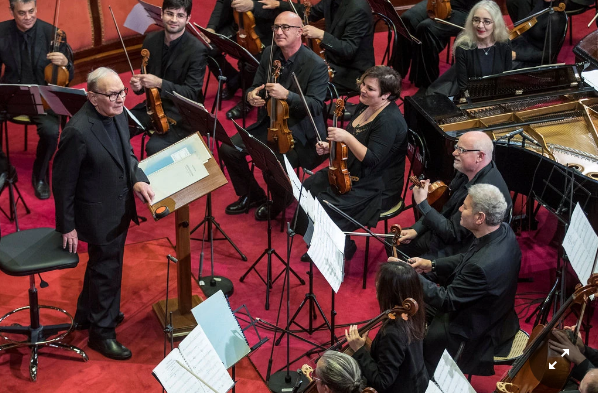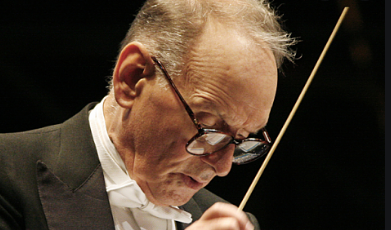|

Ennio Morricone, Music Composer is no more
|
Ennio Morricone, Prolific Italian Composer for the Movies, Dies at 91.
Morricone, who came to prominence with the Italian western “A Fistful of Dollars” and went on to write the most celebrated movie scores of all time.
Renowned for scoring Sergio Leone’s spaghetti Westerns, the Oscar winner also produced the sounds and music for 'Days of Heaven,' 'The Mission,' 'Cinema Paradiso', and 'The Hateful Eight.'
Mr. Morricone’s first film credit was for Luciano Salce’s comedy “The Fascist” (1961). He soon began his collaboration with Mr. Leone, a former schoolmate. But he also scored political films: Gillo Pontecorvo’s “The Battle of Algiers” (1966), Mr. Pasolini’s “The Hawks and the Sparrows” (1966), Giuliano Montaldo’s “Sacco and Vanzetti” (1971) and Mr. Bertolucci’s “1900” (1976).
His atmospheric music scores made him one of the world’s most versatile and influential creators of music for the modern cinema.
|
|
The composer loved the sound of the electric guitar and the Jew’s harp and employed whistles, church bells, whips, coyote howls, chirping birds, ticking clocks, gunshots, and women’s voices to add textures to scores.
“All kinds of sounds can be useful to convey emotion … it’s music made up of the sound of reality,” Morricone said.
Ennio Morricone was a unique talent, composing melodic accompaniments to comedies, thrillers, and historical dramas for world-famous directors like Bernardo Bertolucci, Pier Paolo Pasolini, Terrence, Malick, Roland Joffé, Brian De Palma, Barry Levinson, Mike Nichols, John Carpenter, Quentin Tarantino.
Édouard Molinaro’s “La Cage aux Folles” (1978), Mr. Carpenter’s “The Thing” (1982), Mr. De Palma’s “The Untouchables” (1987), Roman Polanski’s “Frantic” (1988), Giuseppe Tornatore’s “Cinema Paradiso” (1988), Wolfgang Petersen’s “In the Line of Fire” (1993), and Mr. Tarantino’s “The Hateful Eight” (2015). These movies excelled with his talent.
|
|
|
Mr. Morricone won his first competitive Academy Award for his score for “The Hateful Eight” an American western mystery thriller for which he also won a Golden Globe. In a career showered with honors, he had previously won an Oscar for lifetime achievement (2007) and was nominated for five other Academy Awards; in addition, he won two Golden Globes, four Grammys, and dozens of international awards.
He scored music for childhood friend Leones seven films after they had met as kids in elementary school. Morricone’s ripe, pulsating sounds enriched Leone’s low-budget shoot-’em-ups A Fistful of Dollars (1964.)
Leones said, “music is indispensable because my films could practically be silent movies, the dialogue counts for relatively little, and so the music underlines actions and feelings more than the dialogue. I’ve had him write the music before shooting, really as a part of the screenplay itself.”
That is obvious, as his brilliant sensible work includes collaborations with other notable directors like Gillo Pontecorvo, Don Siegel, Bernardo Bertolucci, John Boorman, Edouard Molinaro, John Carpenter, William Friedkin, Brian De Palma, Pedro Almodovar, Franco Zeffirelli, etc.
Morricone regretted and missed out on a chance to do Stanley Kubrick’s classic film A Clockwork Orange (1971)
Ennio Morricone mentioned his special creative experience with Quentin Tarantino “I wrote the score without Quentin Tarantino knowing anything about it, then he came to Prague when I recorded it and was very pleased. So the collaboration was based on trust and great freedom for me.”Mr. Leone’s Films “The Dollars Trilogy” (1)”A Fistful of Dollars”(1964), (2)“For a Few Dollars More” (1965) and (3)“The Good, the Bad and the Ugly” (1966), all released in the United States in 1967, starred Clint Eastwood as “The Man With No Name” and were enormous hits, with a combined budget of $2 million and gross worldwide receipts of $280 million.
|
|
The trilogy’s Italian dialogue was dubbed for the English-speaking market, and the action was brooding and slow, with clichéd close-ups of gunfighters’ eyes. But Mr. Morricone, breaking the unwritten rule never to upstage actors with music, infused it all with wry sonic weirdness and melodramatic strains that many fans embraced with cult-like devotion.
On Morricone scores, The New York Times critic Jon Pareles wrote in 2007. “It’s sometimes a conspirator, sometimes a lampoon, with tunes that are as vividly in the foreground as any of the actors’ faces.”
Ennio Morricone was born in Rome on Nov. 10, 1928, one of five children of Mario and Libera (Ridolfi) Morricone. His father, a trumpet player, taught him to read music and play various instruments. Ennio wrote his first compositions at 6. In 1940, he entered the National Academy of Santa Cecilia, where he studied trumpet, composition, and direction.
His World War II experiences — hunger and the dangers of Rome as an “open city” under German and American armies — were reflected in some of his later work. After the war, he wrote music for radio; for Italy’s broadcasting service, RAI; and for singers under contract to RCA.
Mr. Morricone’s survivors include his wife, Maria Travia, whom he married in 1956 four children, Marco, Alessandra, Andrea (a composer and conductor), and Giovanni; and four grandchildren.

|
|
|
